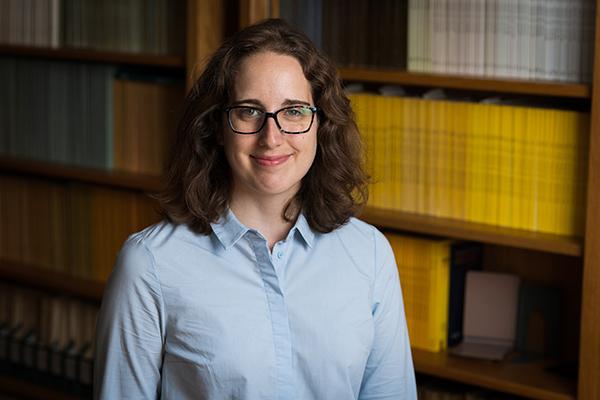
Emma McClure gives it her all in the classroom. While the Philosophy graduate student working at the intersections of feminism, critical race theory, and the ethics of conversation would not deny that teaching comes with its challenges, she finds the work of guiding undergraduates in their learning and thinking too important to not put every last effort into the task. Good, thoughtful teaching, she believes, leads to engaged students—and ultimately to people who go out into the world with a clearer understanding of its workings and a greater will to bring about change for the better.
Her strong sense of purpose, commitment to innovative teaching methods, and deftness in motivating students and fostering their critical thinking skills have not gone unnoticed: in the past few months, McClure was honoured with not one but two awards for her teaching of PHL367 Philosophy of Feminism—Decolonial and Intersectional Feminisms. Last December she received the 2019 Martha Lile Love Teaching Award, and in March, the University of Toronto’s Faculty of Arts & Science selected her as a recipient for a 2019–2020 Superior Graduate Student Course Instructor Teaching Award. In her letter of support, McClure’s teaching mentor, Professor Karolina Hübner, compared McClure’s teaching style to “a sort midwifery,” through which students learned to navigate complex and ethically sensitive issues with respect, care, and honesty in a welcoming environment dedicated to informed, reflective debate.
We spoke with McClure about her approach to teaching, the challenges and joys of being an instructor, and her life beyond the classroom.
What do you try to bring into your classroom?
A sense of hope. All the classes I’ve taught so far have been on depressing topics. My first course was existentialism (no one reads Sartre because they’re happy!), and I’ve taught a unit on #metoo in both my feminism courses. But I try to end each of my courses by suggesting ways in which we could improve the world and mitigate the problems we’ve been discussing. In this class, we finished by watching Moonlight, a movie that demonstrates that we all have the power to change our lives.
What would you say are the most challenging aspects of teaching?
Grading. I’ve gotten better at this task over the years, but it still always fills me with dread. When you’re grading 90 papers, you can’t provide lengthy comments that would genuinely help students improve, and even if you do, will anyone read them?
Do you have a standout fulfilling moment/experience in the classroom?
One particularly memorable class discussion came the week after the Quote Identification Exam. Few philosophers have written on masculinity (with the notable exception of bell hooks), so I asked students to get into groups and discuss whether one of the feminist theorists we’d discussed earlier in the term could be applied to discussions of masculinity. Since they’d just studied for the exam, the students had a great deal to say about ways to expand earlier theories. Each group proposed new directions for future research that I hadn’t considered, and many students were inspired to continue researching masculinity for their final papers.
What do you wish your students knew before joining your class?
I wish my students could name five philosophers who are women of colour, but they can’t.
On the first day of class, I have students name five philosophers they’ve studied before. Then I point out that all the philosophers they named were men. So we do the activity again, trying to come up with five women philosophers. This activity takes a bit longer, but they manage it. Then I point out that all the philosophers we’ve written on the board are white. I challenge them to now name five women of colour philosophers. The majority of the class can’t name a single philosopher who fits this description. A few members of the class who have done their own reading (or taken courses outside the Philosophy Department) manage to come up with five names.
Now I point them to my syllabus and the women philosophers of colour we’ll be studying each week, and I highlight the in-class exam where (along with content questions) I test them on their ability to name the philosophers we’ve been studying this term. I tell them that one of my learning goals for this class is for students to be able to name five women of colour philosophers. Judging by my students’ answers on the in-class exam, every single one of them met and exceeded this learning goal!
Why philosophy? What brought you to the field in the first place?
Honestly? I took my first philosophy class on a dare. My parents bet me that I would enjoy philosophy, whereas I (knowing very little about the subject) was convinced that philosophy was a waste of time. Obviously, I lost that bet.
What are you working on right now?
Part of why this class was so enjoyable for me is that it intersects so much with my research. I write about the ethics of microaggressions from an intersectional feminist and critical race theory perspective. Right now I’m working on the third chapter of my dissertation, where I argue that microaggressions are not (merely) a collective harm problem. Although microaggressions may only become noticeably harmful after they are repeated, each microaggression wrongs the individual target by disrespecting their autonomy.
What do you enjoy outside the university?
Most of the year, I read a lot of fantasy books and play a lot of board games. (Like, a lot.) When not under quarantine, I enjoy hiking and communing with the sea.
SHARE